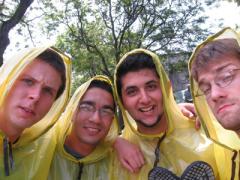
Iraqi students on road trip to Niagara Falls
[Editor’s Note: Below is information about an organization devoted to helping Iraqi students. Details are at http://iraqistudentproject.org/]
Iraq: A Cradle of Civilization in Ruins
Iraq’s people were among the first to learn irrigation, to invent the system of writing sounds that is key to our own alphabet, to create a legal system that is the foundation of modern law. During the early Islamic centuries Iraq was a center where ancient learning was translated and preserved, where poetry and music and medicine flourished. In modern times Iraqis have built a thriving system of higher education and have sent thousands of students to study all over the world, returning to teach and work in Iraq. Western institutions of higher learning benefit from the contributions to scholarship and human development that have taken place across the centuries in Iraq. Continue reading Iraqi Student Project
